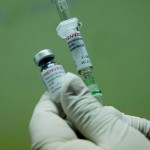
World Meningitis Day is celebrated today, and while the national and international health priority is focused on preventing the effects of the pandemic by Covid-19, specialists recommend that you do not neglect the prevention of other diseases through immunization.
Invasive meningococcal disease (EMI) can occur as meningitis or as a generalized infection (sepsis), making it difficult to recognize in the early stages.
Rodolfo Villena, infectious paediatrician at the University of Chile, stressed that EMI is difficult to diagnose and can be fatal in about 25% of cases if left untreated, and cause significant damage and permanent sequelae. He also cautioned that while anyone may suffer it, infants are more vulnerable due to the immaturity of their immune system.
The specialist added that meningococcal disease occurs “in most cases in previously healthy patients, being able to have a fulminant course, with nonspecific symptoms and early signs, so it can be mistaken for a viral infection in its early hours. For these reasons, prevention through immunization (vaccines) against meningococcal has proven to be the most efficient strategy for its control at the population level.”
Indeed, initial symptoms of Meningitis may include fever, headache, nausea and vomiting.
It should be noted that in Chile, during 2019, the Department of Epidemiology of the Ministry of Health confirmed 69 cases of EMI, where serogroup B accounted for 46% and W 43% of them. The incidence rate fell to 0.4 cases per hundred thousand inhabitants, with 22 deaths reported, with a lethality of 32%.11 If someone is suspected of having meningitis, the recommendation is to go to the nearest health center immediately.
There are also five main serogroups or meningococcal types: A, B, C, W and Y9, and more than one vaccine is needed to protect against all of them. The current immunization schedule in Chile includes a vaccine against serogroups A, C, W and Y at 12 months of life.
EMI is difficult to diagnose and leads to high morbidity and mortality. It occurs in most cases in patients under 1 year and previously healthy, being able to have a fulminant course, with nonspecific symptoms and signs, so it can be confused with a viral infection in its first hours, being the main cause of bacterial meningitis.
About one in 10 people who get the disease could die, even in most of the industrialized world, with the right treatment. In addition, about 20 percent of those who survive the disease may suffer from significant physical or neurological disabilities, such as limb loss, hearing loss, or seizures.
It should be recalled that WHO commemorates World Meningitis Day on 24 April, to help patients and NGNs raise awareness of the signs and symptoms of meningitis. Apart from the manifestations already noted, the most specific or advanced signs of this disease include stiffness in the neck, sensitivity to light or rash that do not disappear when pressed on the skin.
World Meningitis Day is part of World Immunization Week, so this date is commemorated to raise awareness of existing options that help protect against meningitis, the most effective being vaccination.





